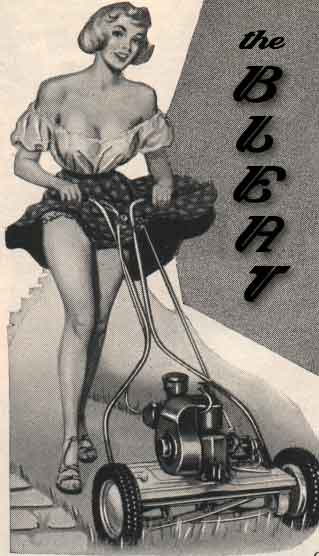 |
|
 Today: more of the same, then a beer with Kerry Today: more of the same, then a beer with Kerry
Around 1:30 I’m coloring with Gnat. Another Little Fargin' Pony tableau. An alarm goes off somewhere – car? House? It doesn’t stop after a minute or two, so I go outside, get a fix on the position, and call 911.
“I’m reporting an alarm, a car but probably a house; it’s been unattended for a few minutes.”
The dispatcher asks if it’s on (insert my street here) street. I say yes. “We’ve sent someone,” she says.
Try that in New York City.
It doesn’t stop. Field’s put another little ad in my mailbox yesterday. This is interesting:
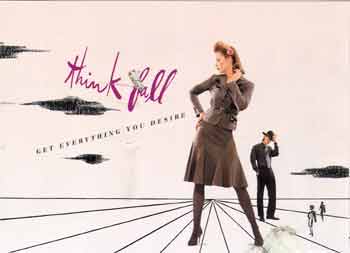
A throwback to that brief late 40s enthusiasm for Dali-esque perspective lines. The typeface fits the period, too. As does the hair:
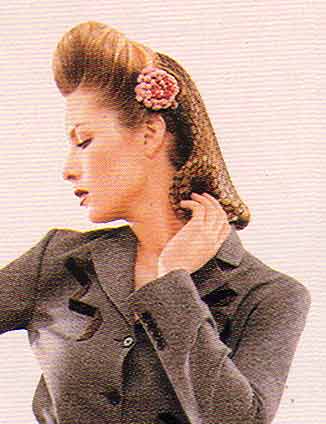
But then they have to dump a big steaming load of 70s in the picture:
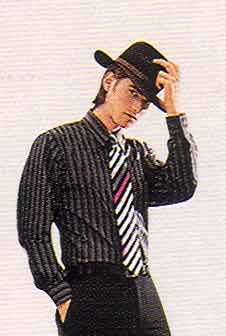
Ugh. So we’re back to the Studio 54-meets-Paper-Moon-and-has-sex with– it-in-the-men’s-room vibe. Just great. And what’s inside the circular?
Gaah!
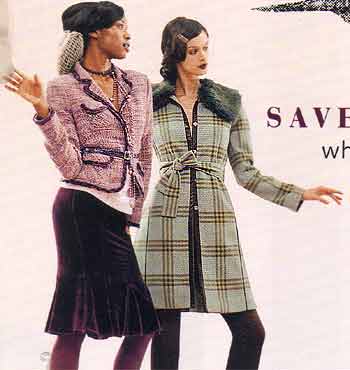
Whoa: how’s this for timing? I just checked the mail, and there’s a big thick glossy catalog from Field’s. More of the same, but this time the cover illo – the same as above – says “Dream Life.” Inside: “The landscape is dotted with objects of desire. Here in our subconscious state, we are free to dream our dreams and dress the part.” So they know the whole Dali / surreal / “Spellbound” idea.
And then there’s this act of unforgiveable mulletry, described thus: “Déjà vu. Been there, but never done anything like this. The appeal of retro with modern styling is the newest look for fall.”

Dude. Please. You can take a stand, fella; you can tell the photographer, the stylist, the lighting director, and anyone else from creative who wanders by that no one is going to buy this crap.
At this point I realize I should write my Sunday column about this. So I will. Tune in later.
I don’t like these candid candidate interviews, because they usually diminish the office and the man seeking to hold it. I don’t care who gives the candidate a sudden blush in the groinal region, especially if they name someone 30 years their junior; it’s like catching Grandpa reading 17 magazine. As for musical tastes, it’s more meaningless information. I like Bruckner, and the Pet Shop Boys. I like 1930s pop music, except for country. So? These details give a false sense of intimacy, and while that’s fine for tweens swooning because the latest issue of Tiger Beat says that Bobby Sherman loves hot dogs and OH GOSH I LIKE THEM TOO!!!, it doesn’t really tell me much. I'd prefer to read an exchange like this:
"What would I do? Well, if North Korea launched a nuclear missile that so much as grazed the 12 mile limit of our westernmost Aleutian island, I wouldn’t hesitate to turn the entire country into a smooth sheet of glazed rock. You cannot take such an action lightly, because the world would be watching."
"But doesn’t that conflict with your previous remarks about how much you enjoyed Dylan’s music?"
"What the Sam Hell does Dylan have to do with it? We’re talking about war. He’s just a musician. I’m not likely to base my foreign policy on some obscure metaphors warbled over a six-string accompaniment. I like Bobby Darin too. Does that mean I have to consult with the mayor of Berlin just because I whistle Mack the Knife from time to time?"
I don’t trust any major politician who knows too much about pop culture. I prefer that they note simply that their job requirements are rather demanding these days. Things being what they are.
This part seemed typical:
"Kerry tells Hainey that he had a telephone relationship with Marlon Brando in 1985 and 1986, during the contras: 'He took a huge interest in it. And he would call me. He was always asking questions. And he'd give me advice. I took his advice on a couple of angles. A couple of points.'
Which ones? Perhaps the article has the details, and we will learn that Kerry based his pro-Sandinista policies on Mr. Brando’s keen grasp of Central American political dynamics. After all, Mr. Brando appeared, dimly, in a movie about a war set in a hot place with many broad-leafed plants, which gave him keen insights on the geopolitical struggle that temporarily manifested itself in Nicaragua.
It's instructive to remember those humid times, and how right-thinking people lined up behind Ortega and sneered at the Contras. Olympian observers from the Boston Globe said:
On April 18, 1985, Kerry and Harkin, reporters in tow, flew to Managua to meet with top Sandinista officials. A congressional vote on Reagan's request for aid to the contras was five days away. And the pair of senators hoped their efforts could revive stalled peace negotiations between the United States and the Sandinistas.
"My generation, a lot of us, grew up with the phrase 'give peace a chance,' as part of a song that captured a lot of people's imagination,' " Kerry would soon tell his Senate colleagues. "I hope that the president of the United States will give peace a chance."
Openly partisan Accuracy in Media says:
Kerry's opposition to freedom for Nicaragua was so intense that he traveled to Nicaragua with Senator Tom Harkin to offer support to Sandinista dictator Daniel Ortega.
This may sound like a harsh judgment, but it is essentially the same analysis presented in the book about Kerry written by reporters for the Boston Globe "who know him best." They describe how Kerry and Harkin traveled to Nicaragua on April 18, 1985. A congressional vote on aid to the Contras was just days away. Kerry wanted to negotiate with the communists in Nicaragua and "give peace a chance." Like Neville Chamberlain waving a printed statement hailing "peace for our time" with Hitler, Kerry brought back a peace proposal to derail Reagan's request for Contra aid.
But there was a problem, the Globe reporters conceded: "In the document Kerry delivered, Ortega reaffirmed the 'non-aligned nature' of the Nicaraguan revolution, despite the country's ties to the Soviet Union and Cuba. And, in response to promises that civil liberties would be restored, the State Department said Ortega had extended for six months the government's repressive state of emergency—the day after meeting with Harkin and Kerry."
Then, one day after Tip O'Neill's House of Representatives rejected the Reagan aid request for the contras, Ortega "boarded an Aeroflot jet to Moscow to collect a $200 million loan." Kerry said that he was "as mad as anyone" that Ortega went to Moscow. But Connecticut Senator Chris Dodd said, "Where did my colleagues think he was going to go? Disney World? The man is a Marxist."
The lyrics to “Give Peace a Chance,” by Lennon and McCartney:
Let me tell you now
Ev'rybody's talking about
Revolution, evolution, masturbation,
flagellation, regulation, integrations,
meditations, United Nations,
Congratulations.
All we are saying is give peace a chance
All we are saying is give peace a chance
Ev'rybody's talking about
John and Yoko, Timmy Leary, Rosemary,
Tommy Smothers, Bobby Dylan, Tommy Cooper,
Derek Taylor, Norman Mailer,
Alan Ginsberg, Hare Krishna,
Hare, Hare Krishna
All we are saying is give peace a chance
All we are saying is give peace a chance
If that doesn’t capture your imagination, good; it shows your imagination can outrun its flat-footed pursuers. But leave all that aside: if Reagan had consulted with Sylvester Stallone for advice in defeating the Soviets, this would be bedrock political lore. Gonzo called Rambo! Livin’ in a frickin’ dream world, man! It’s all Hollywood to him! Kerry takes advice from an addled sun-basted jabba who may be the only man capable of mumbling in a falsetto, and we’re not supposed to laugh? Maybe the interview has more details; perhaps I'm being unfair. But if the candidate advanced this anecdote to pump himself up (Brando called me; naturally I paid heed, where appropriate) it's instructive. When I read that a candidate for the highest office in the land took Brando's call to discuss the contras, I want to see the line "Kerry grinned, and rolled his eyes." Because, you know, Brando's an actor. It's like Bush saying he took a call from Tom Selleck, who had recently played Ike and had some keen insights on the nature of warfare.
But I’m off track. I don’t know if GQ runs a “Beer With” series every month; sounds like a regular feature. I stopped reading the magazine when they dropped James Ellroy. If they did chose that title for Kerry, I think they knew what they were doing – because you can’t do the same with Bush. He’s the candidate that doesn’t drink.
You can gauge your opinion of the President thus. You’re a GQ writer assigned to do the Bush version of the Kerry story. You meet W at the White House. Refreshments are offered. “Mind if I have a beer?” you ask. “That’s sort of the angle we use for this segment.” Bush's reaction:
1. With a tight expression, and beady eyes that dart left and right before fixing on you with the strange, almost unworldly hatred that the Salem judges must have felt for the voluptuous women they sought to hang for witchcraft, the president gives a curt nod of approval
2. “Hey, it’s August in Washington. Gotta cool down. I’m going to stick with this coke, if I can get a refill here? See, she won’t give me one. Thinks I should switch to the diet stuff. Alright, what’s your first question?"
Your call. Oh: the alarms went off again, half an hour after I called 911. This time I figured it was someone screwing up and annoying everyone else. I didn't call. Screw 'im!
There's a little New Yorker in all of us. It's located in the spleen.
|